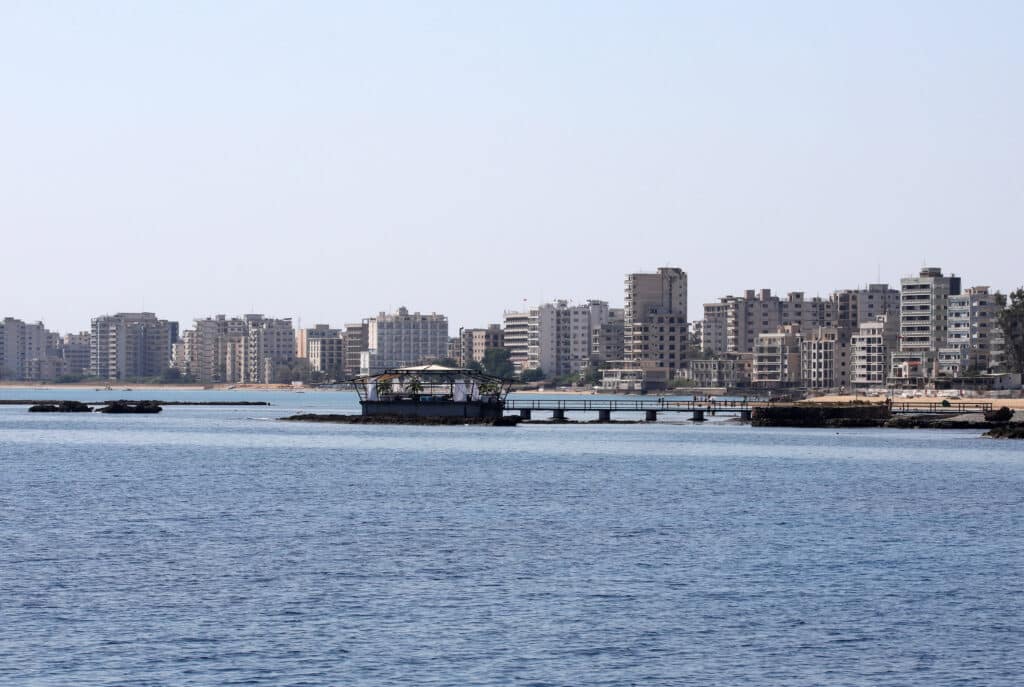Commentators in the north say the three properties reported to be sold this week could lead to legal amendments so more could follow
The agreement made for the purchase of three hotels in Varosha between a Turkish Cypriot businessman and their Greek Cypriot owners appears to have no validity and is most probably an attempt to push for legal amendments in the north to open the way for the sale of properties in the fenced-off city.
A Turkish Cypriot newspaper recently reported that a Turkish Cypriot businessman bought the Cleo Hotel, the Golden Seaside Apartment Hotel, the Aegean Hotel and two apartment building floors in Varosha from their Greek Cypriot owners.
However, lawyer Murat Metin Hakkı, who specialises in property cases, clarified to the Cyprus Mail, that the agreement between the Turkish Cypriot businessman and the Greek Cypriot owners stipulates that the ownership of the hotels will be transferred to the businessman only if the Immovable Property Commission (IPC), which is the sole authorised body to approve Greek Cypriot property sales in the north, approves the sale within one year.
“If it is not approved by the IPC within a year, the agreement will be null and void,” Hakkı said.
In fact, IPC chairwoman Növber Ferit Vechi confirmed that they received an application on Thursday regarding the sale of the hotels. She clarified that no sale transactions had yet been made through the commission and added that the application was sent back due to missing documents.

However, the IPC, which is recognised by the European Court of Human Rights (ECHR) as a domestic remedy to property issues in Cyprus arising from the island’s division, has no jurisdiction over military areas in the north including Varosha, lawyer Murat Metin Hakkı said.
Another way such a property sale could be possible is through a law known as the ‘Acapulco law’ – because it enabled a Turkish Cypriot businessman to buy part of the Acapulco resort in Kyrenia from its original Greek Cypriot owner – that allows the Greek Cypriot owner of a property to reach a sales agreement with the current user and long-term lease holder, according to Hakkı.
However, “this law doesn’t apply to the agreement in question, since the buyer is not a current user and a long-term lease holder of these properties,” he added. “There is no way the commission can approve this agreement since it involves a military area and is not in line with any local law.”
Even though the sales agreement appears to have been certified by a notary in the Republic, “this has nothing to do with the substance of the agreement,” Hakkı said. “This is merely a certification of the signatures on the agreement. And the related apostille is the certification of the certification by the notary. None of these constitute official approval of the content of the agreement… Therefore, this agreement has no legal basis whatsoever and is invalid. It’s nothing but writing on ice.”
This, of course, is only true if the current status of Varosha and the current laws remain unchanged.
Hakkı believes the reason for making a sales agreement, which, under existing laws, is invalid, may be to push for the change in the military status of Varosha and make the necessary legal arrangements to allow property sales by Greek Cypriots to Turkish Cypriots in the fenced-off city.
Researcher Mete Hatay agrees. “This is not even a shenanigan,” he says. “This is a cunning way of forcing the authorities to enable such sales, financially and legally”. The buyer “is presenting this as a national cause and saying ‘look, you wanted to Turkify Varosha! The Greek Cypriots are ready to sell all, so do something.’”
In fact, the Turkish Cypriot businessman quoted in the newspaper on the sale emphasised that he has “earned territory for the Turkish Republic of Northern Cyprus” and called the move a “great step” for the breakaway republic.
“The position of Turkey and the Turkish Republic of Northern Cyprus on Varosha is very clear,” the businessman said. “I don’t expect to be faced with any problems.”
Feeding the doubts, secretary general of the National Unity Party (UBP), which is the major party of the ruling coalition in the north, Oğuzhan Hasipoğlu in statements to a newspaper on Friday, suggested a “special Varosha law” may be considered.
The fenced-off city of Varosha has remained a forbidden military zone since August 1974 when its Greek Cypriot population fled from the advancing Turkish army. It is among places to be returned to its lawful former Greek Cypriot inhabitants under the control of the future Greek Cypriot constituent state within the framework of a comprehensive federal solution on the island. However, the Turkish government, with the Turkish Cypriot administration, has partly opened around 3.5 per cent of Varosha since 2020 despite UN resolutions prohibiting the move. Turkish and Turkish Cypriot authorities have since been vocal about plans to take forward the “Varosha opening.”
Turkish Foreign Minister Mevlüt Çavuşoğlu, commenting on the developments said earlier this week: “We are encouraging Turkish Cypriots and our own citizens to buy if the owners want to sell. It is very important for Turks to take possession of these properties… And we see that the Greek Cypriot people support our policy.”
Lawyer Hakkı confirmed the same Turkish Cypriot businessman is in the process of signing agreements with Greek Cypriot owners regarding the sale of six other hotels in Varosha.
“The majority of the Varosha refugees are tired of the status quo,” Hakkı said. “They are inclined to just sell their properties.”

